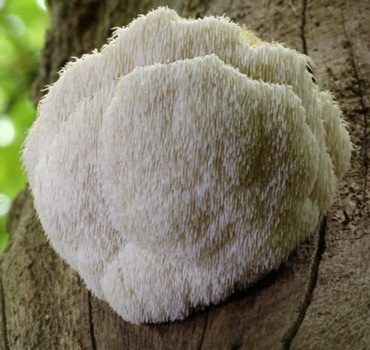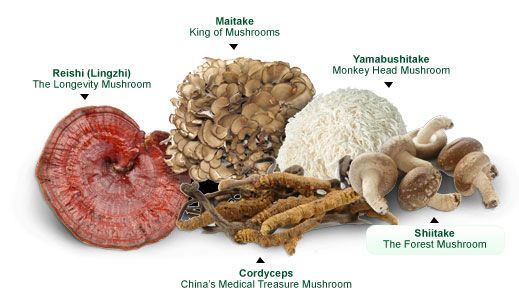Mushroom Health Benefits

LIONS MANE
Lion's Mane Mushroom, scientifically known as Hericium erinaceus, is a fascinating and unique fungi species celebrated for its distinctive appearance, potential health benefits, and rich historical and ecological significance.
*Appearance and Habitat:*
Lion's Mane Mushroom is instantly recognizable due to its distinctive appearance, resembling cascading icicles or a lion's mane, which gives it its common name. This mushroom is primarily found in temperate forests across North America, Europe, and Asia. It typically grows on hardwood trees, especially oak and beech, as a saprophytic organism, meaning it feeds on decaying wood. The mushroom's growth typically occurs during the late summer and fall months.
*Historical and Cultural Significance:*
Lion's Mane Mushroom has a long history of use in traditional Asian medicine, particularly in China, Japan, and Korea, where it is known as "Yamabushitake" or "Hou Tou Gu." Historical texts in these regions have documented its medicinal use dating back centuries. It was revered for its potential to enhance cognitive function, boost the immune system, and promote overall vitality. In Chinese traditional medicine, it was often prescribed to support digestive health as well.
*Health Benefits:*
Lion's Mane Mushroom has gained significant attention in recent years for its potential health benefits, which are backed by scientific research. Some of the key health benefits include:
1. *Cognitive Enhancement:* Lion's Mane is believed to support brain health and cognitive function. Compounds in the mushroom, such as hericenones and erinacines, have been studied for their neuroprotective properties and their potential to stimulate nerve growth factor (NGF) production, which is essential for nerve cell maintenance and growth. This could have implications for conditions like Alzheimer's and Parkinson's disease.
2. *Immune Support:* The mushroom contains bioactive compounds that may enhance the immune system's response, potentially helping the body fend off infections and diseases.
3. *Digestive Health:* Lion's Mane may contribute to gastrointestinal well-being by promoting a healthy gut microbiome. This could aid in digestion and reduce inflammation in the digestive tract.
4. *Anti-Inflammatory Properties:* Some research suggests that Lion's Mane Mushroom has anti-inflammatory effects, which could be beneficial for conditions associated with chronic inflammation.
5. *Antioxidant Activity:* It's rich in antioxidants that combat free radicals in the body, potentially reducing oxidative stress and cellular damage.
6. *Mood and Anxiety:* There is emerging research into the mushroom's potential to improve mood and reduce symptoms of anxiety and depression, possibly through its impact on brain health.
*Preparation and Consumption:* Lion's Mane can be consumed in various forms, including fresh, dried, or as a dietary supplement. It is often cooked and used in culinary dishes, where its texture is likened to that of seafood, making it a popular choice for vegetarians and vegans. Lion's Mane can be sautéed, added to soups, stir-fries, or even brewed into teas and coffees. Its adaptability in the kitchen has contributed to its popularity in the culinary world. In conclusion, Lion's Mane Mushroom is a remarkable natural organism with a rich history of traditional use and a growing body of scientific evidence supporting its potential health benefits. As our understanding of this mushroom continues to expand, it holds promise as a versatile natural remedy for various aspects of human health and well-being.
Turkey Tail (Coriolus versicolor)
The turkey tail mushroom, scientifically known as Trametes versicolor, is a remarkable fungus with a rich history, numerous health benefits, and a wide-ranging habitat.
Let's delve into its intriguing story.
*History:*
The turkey tail mushroom has been an integral part of traditional medicine in various cultures for centuries. Its use dates back to ancient China and Japan, where it was known as "Yun Zhi" and "Kawaratake," respectively. In traditional Chinese medicine, it was revered for its immune-boosting properties, while in Japan, it was associated with longevity and vitality. Indigenous North American tribes also utilized turkey tail in their healing practices.
*Health Benefits:*
1. *Immune Support:*
Turkey tail is renowned for its immune-enhancing properties. It contains compounds like polysaccharopeptides (PSP) and beta-glucans, which stimulate the immune system and help the body defend against infections.
2. *Cancer Support:*
Research has shown that turkey tail mushrooms may have anticancer effects. They can help improve the effectiveness of cancer treatments like chemotherapy and radiation, and some studies suggest they may slow the growth of cancer cells.
3. *Antioxidant Power:*
Loaded with antioxidants, turkey tail mushrooms combat free radicals in the body, reducing oxidative stress and inflammation. This can benefit overall health and reduce the risk of chronic diseases.
4. *Digestive Health:*
Some studies indicate that turkey tail mushrooms may support gut health by promoting the growth of beneficial gut bacteria, which can aid in digestion and improve nutrient absorption.
5. *Antiviral Properties:*
Turkey tail has shown promise in fighting viruses, including the human papillomavirus (HPV) and hepatitis C. It may have a role in managing viral infections.
*Environment it Grows:*
Turkey tail mushrooms are incredibly adaptable and can be found in a wide range of environments. They typically grow on decaying logs, fallen branches, and stumps of hardwood trees. Their name comes from their fan-shaped, multi-colored caps that resemble the tail feathers of a wild turkey. These mushrooms are found in diverse ecosystems, from temperate forests to tropical rainforests. They play a crucial role in the ecosystem by breaking down dead wood and returning nutrients to the soil. This decomposition process is vital for forest health and regeneration. In conclusion, the turkey tail mushroom is not only a fascinating organism with a storied history but also a potential powerhouse of health benefits. Its adaptability and role in the environment make it a remarkable and important part of the natural world, offering both medicinal and ecological value to those who seek to understand and harness its potential.
REISHI MUSHROOMS
Reishi mushrooms, scientifically known as Ganoderma lucidum, are a fascinating and highly esteemed species in the world of traditional medicine and mycology. These unique mushrooms have a rich history, numerous health benefits, and specific environmental requirements for growth.
*History:*
Reishi mushrooms have been revered in Asian cultures for over 2,000 years, earning them nicknames like the "Mushroom of Immortality" and the "Herb of Spiritual Potency." Ancient Chinese texts, including the "Shen Nong Ben Cao Jing," documented their use in traditional medicine for promoting longevity and vitality. They were reserved for emperors and nobility due to their rarity and perceived health benefits.
*Health Benefits:*
1. *Immune Support:* Reishi mushrooms are known for their immune-boosting properties. They contain compounds like beta-glucans and triterpenes, which can enhance the immune system's function.
2. *Stress Reduction:* Reishi mushrooms are considered adaptogens, helping the body adapt to stress and reduce its negative impacts on health.
3. *Anti-Inflammatory:* They possess anti-inflammatory properties and may aid in managing conditions associated with chronic inflammation.
4. *Cardiovascular Health:* Some studies suggest that reishi mushrooms may help lower blood pressure and cholesterol levels, benefiting heart health.
5. *Cancer Support:* While more research is needed, there's interest in the potential of reishi mushrooms in cancer treatment, as they contain bioactive compounds that could inhibit tumor growth.
*Environment:*
Reishi mushrooms are typically found growing on decaying hardwood trees, especially oak and maple. They thrive in humid, forested environments, particularly in Asia. The optimal conditions for their growth include specific temperature, humidity, and sunlight levels. Cultivation has become more common to meet the increasing demand for reishi mushrooms. In recent years, reishi mushrooms have gained popularity worldwide, and their health benefits are being explored through scientific research. While they are available in various forms, including capsules, extracts, and teas, caution should be exercised, especially when foraging in the wild, as some species may be toxic. In conclusion, reishi mushrooms have a storied history, offer a range of potential health benefits, and grow in specific environmental conditions. Whether you're interested in their medicinal uses or simply fascinated by their cultural significance, reishi mushrooms continue to captivate both traditional healers and modern scientists alike.
CHAGA MUSHROOM
Chaga mushroom, scientifically known as Inonotus obliquus, is a fascinating fungus with a rich history and numerous health benefits.
Here's a description covering its history, health benefits, and its natural environment:
*History:*
Chaga has a long history of use in traditional medicine, particularly in Siberia, Russia, and other parts of Asia. It was valued for its potential to boost overall health and vitality. In the 16th century, Chinese and Korean herbalists documented its medicinal properties, and it gained recognition in Western alternative medicine more recently.
*Health Benefits:*
1. *Immune Support:*
Chaga is known for its immune-boosting properties. It contains beta-glucans, which may enhance the immune system's response to infections.
2. *Antioxidant Power:*
Chaga is rich in antioxidants, such as melanin and superoxide dismutase. These compounds help neutralize harmful free radicals in the body, reducing oxidative stress and potentially lowering the risk of chronic diseases.
3. *Anti-Inflammatory:*
Chaga may help reduce inflammation due to its high concentration of betulinic acid, which has anti-inflammatory properties. This could benefit individuals with conditions like arthritis.
4. *Cancer-Fighting Potential:*
Some studies suggest that chaga extracts may inhibit the growth of cancer cells and stimulate apoptosis (cell death) in cancerous cells. However, more research is needed in this area.
5. *Gut Health:*
Chaga may support digestive health by promoting the growth of beneficial gut bacteria. This could potentially improve overall gut function.
*Environment:*
Chaga mushrooms are typically found in cold northern climates, primarily on birch trees. They have a distinctive appearance, resembling a black, burnt mass on the tree's bark. Chaga is a parasitic fungus that grows on the wounds or broken areas of birch trees, where it feeds off the tree's nutrients. The harsh environmental conditions in these regions contribute to the development of the potent bioactive compounds within the mushroom. In recent years, Chaga has gained popularity as a dietary supplement and herbal remedy. However, it's crucial to exercise caution when using Chaga, as its safety and effectiveness can vary based on factors like preparation and dosage. Consulting with a healthcare professional before incorporating it into your routine is advisable. Overall, Chaga mushroom's historical significance, potential health benefits, and unique natural habitat make it a compelling subject of interest in the realm of herbal medicine and nutrition.



